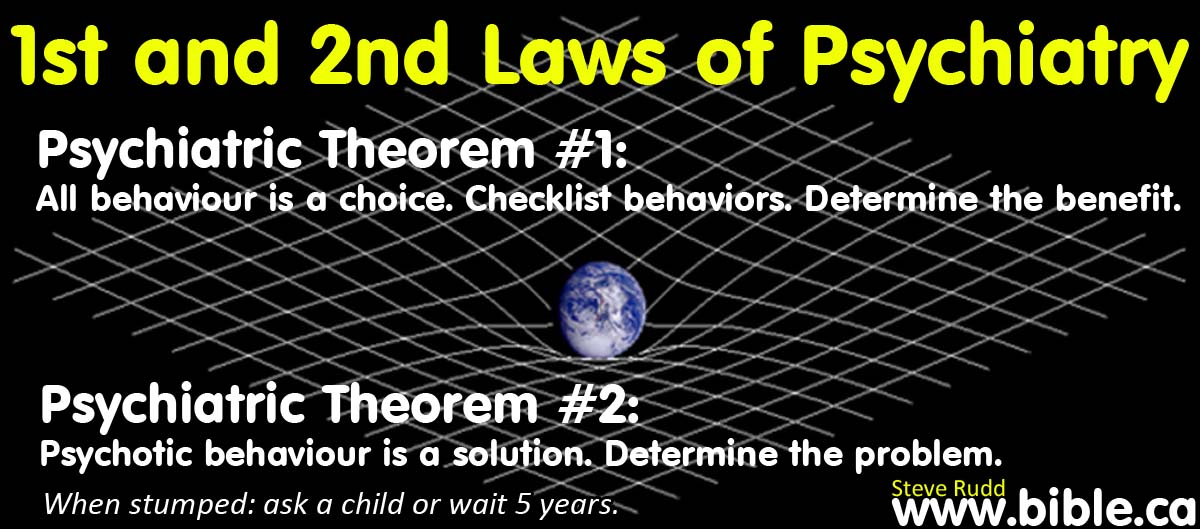The case of "Socrates" (Schizophrenia, megalomania, salad talk)
Casebook of Biblical Psychiatry © Version 7 (CBP-7)
|
Based upon |
Casebook of Biblical Psychiatry© brings the principles of Biblical Psychiatry to life based upon real-world cases and familiarizes Christians with different types of situations. This practical companion volume to Biblical Psychiatry© includes not only diagnosis, but also in-depth discussions by experienced Christians for Biblical approaches to treatment. This meticulously detailed volume of dynamic real-life case studies is simply a "must read" for all clinical Psychiatrists, mental health care professionals and Christians interested in expert opinion on today's treatment approaches. Psychiatric students, educators, and practitionersóas well as social workers, nurses, medical physicians, and interested laypersonsówill find this unique volume of inestimable value in their day-to-day work.
|
|
|
|
|
The case of (Schizophrenia, megalomania) |
|
|
|
|||||
|
|
The case of "Socrates" |
||||
|
|
Biopsychiatric labels DSM-5 |
Schizophrenia, (dementia praecox) delusion, paranoia, megalomania |
|||
|
|
Checklist Behaviours DSM-7 |
Delusion, Deception, lying, arrogance, pride, laziness |
|||
|
|
Insights MMPI-7 |
||||
|
|
Quick Pick EDS-7.1 |
Insanity |
|||
|
|
Self-disablement EDS-7.2 |
Full self-disablement in asylum for 20 years. |
|||
|
|
Chemical imbalance EDS-7.3 |
No |
|||
|
|
Benefits EDS-7.4 |
Fun, entertainment, relief from boredom and monotony: EDS-7.4.2 Attention seeking, Pride, Praise, Honour, Fame: EDS-7.4.3 Escape duty or life situation: EDS-7.4.4 Sympathy: EDS-7.4.5 Victimhood: EDS-7.4.13 |
|||
|
|
Monetary EDS-7.5 |
- |
|||
|
|
Annoyance Scale EDS-7.6 |
High |
|||
|
|
Diagnostic Laws EDS-7.7 |
Law of Narcissistic Behaviour Choice (NBC) EDS-7.7.1.NBC Law of Derivative Personal Benefit (DPB) EDS-7.7.2.DPB Law of Domino Problem Transference (DPT) EDS-7.7.4.DPT Law of Annoyance Toleration Threshold (ATT) EDS-7.7.5.ATT |
|||
|
|
Determine the Problem |
Suffering from high self-esteem and laziness |
|||
|
|
Ask a Child |
She is having a lot of fun saying silly things in front of people. EDS-7.7.12.PMO |
|||
|
|
5 years later EDS-7.7.LPT |
In an asylum where she wanted to be. |
|||
|
|
|
||||
The case of "Socrates"
Carl Jung, psychiatrist and founder of analytical psychology, a woman suffering from high self-esteem, is unwilling to accept the low circumstances of her unhappy life situation, choses to become schizophrenic with outbursts of delusions of grandeur.
"Another patient's story revealed to me the psychological back-ground of psychosis and, above all, of the "senseless" delusions. From this case I was able for the first time to understand the language of schizophrenics, which had hitherto been regarded as meaningless. The patient was Babette S., whose story I have published elsewhere.' In 1908 I delivered a lecture on her in the town hall of Zurich. She came out of the Old Town of Zurich, out of narrow, dirty streets where she had been born in poverty-stricken circumstances and had grown up in a mean environment. Her sister was a prostitute, her father a drunkard. At the age of thirty-nine she succumbed to a paranoid form of dementia praecox, with characteristic megalomania. When I saw her, she had been in the institution for twenty years. She had served as an object lesson to hundreds of medical students. In her they had seen the uncanny process of psychic disintegration; she was a classic case. Babette was completely demented and given to saying the craziest things which made no sense at all. I tried with all my might to understand the content of her abstruse utterances. For example, she would say, "I am the Lorelei"; the reason for that was that the doctors, when trying to understand her case, would always say, "Ich weiss nicht, was soil es bedeuten." Or she would wail, "I am Socrates' deputy." That, as I discovered, was intended to mean: "I am unjustly accused like Socrates." Absurd outbursts like: "I am the double polytechnic irreplaceable," or, "I am plum cake on a corn-meal bottom," "I am Germania and Helvetia of exclusively sweet butter," "Naples and I must supply the world with noodles," signified an increase in her self-valuation, that is to say, a compensation for inferiority feelings." (Memories Dreams Reflections, Carl Gastav Jung, 1961 AD, p 125)
DISCUSSION:
This woman was unwilling to accept her low life for what it was and find personal contentment. Clearly suffering from high self-esteem, and wanting to escape her low life situation, she chose to become schizophrenic as a solution. Her verbal outbursts were sinful lies that were tolerated and studied rather than rebuked. The second theorem of psychiatry says: Psychotic behaviour is a solution. Identify the problem, which in this case, was she didn't like her life situation.
Barbette full list of benefits that she was deriving from her psychotic behaviour are not known, but not needed for us to address the central point: She knew exactly what she was doing. Every bizarre phrase she uttered had meaning to her, in her own little world she had constructed. The human imagination can make many connections grounded in meaning. While psychiatrists describer her words as salad talk, implying they are random and meaningless, they were actually rather clever and ingenious applications to literature, history and events to herself.
If you asked Barbette, "what does that mean"? She wouldn't answer, but be thrilled that her patient fishing for attention had some nibbles. She doesn't want you to know the meaning because if you understood, you would tell her to grow up and walk away. Essentially she was doing what two year old children do for attention, praise and sympathy. He was suffering the consequences of her own high self-esteem.
Discussion:
Benefits from behaviour: This illustrates the Law of Narcissistic Behaviour Choice (NBC) EDS-7.7.1.NBC
- Fun, entertainment, relief from boredom and monotony: EDS-7.4.2. She was clearly entertaining herself in public.
- Attention seeking, Pride, Praise, Honour, Fame: EDS-7.4.3. She loved being the object of lectures, being studied and being asked what her stupid narcissistic statements meant.
- Escape duty or life situation: EDS-7.4.4. She is in an asylum to escape her own real world.
- Sympathy: EDS-7.4.5. Her bloviating was either "look at how amazing I am" or "I am a victim", both designed to garner sympathy.
5. Victimhood: EDS-7.4.13. The fact she is in an asylum means that she has caused all her relatives a lot of trouble but she makes herself out to be the victim.
Diagnostic laws that are seen illustrated in the case of "Socrates":
- She calculated that the cost of being labeled insane was worth the benefit of escaping her unhappy home life to live in "hotel asylum" and being the object of lectures and books. This illustrates the Law of Derivative Personal Benefit (DPB) EDS-7.7.2.DPB
- She transferred her problems to a lot of people who had to cater to her daily needs for 20 years. This illustrates the Law of Domino Problem Transference (DPT) EDS-7.7.4.DPT
3. When Barbette became annoying enough to her relatives, they sought to have her removed as a way of gaining relief from her. This illustrates the Law of Annoyance Toleration Threshold (ATT) EDS-7.7.5.ATT
By Steve Rudd: Contact the author for comments, input or corrections.
Send us your story about your experience with modern Psychiatry


